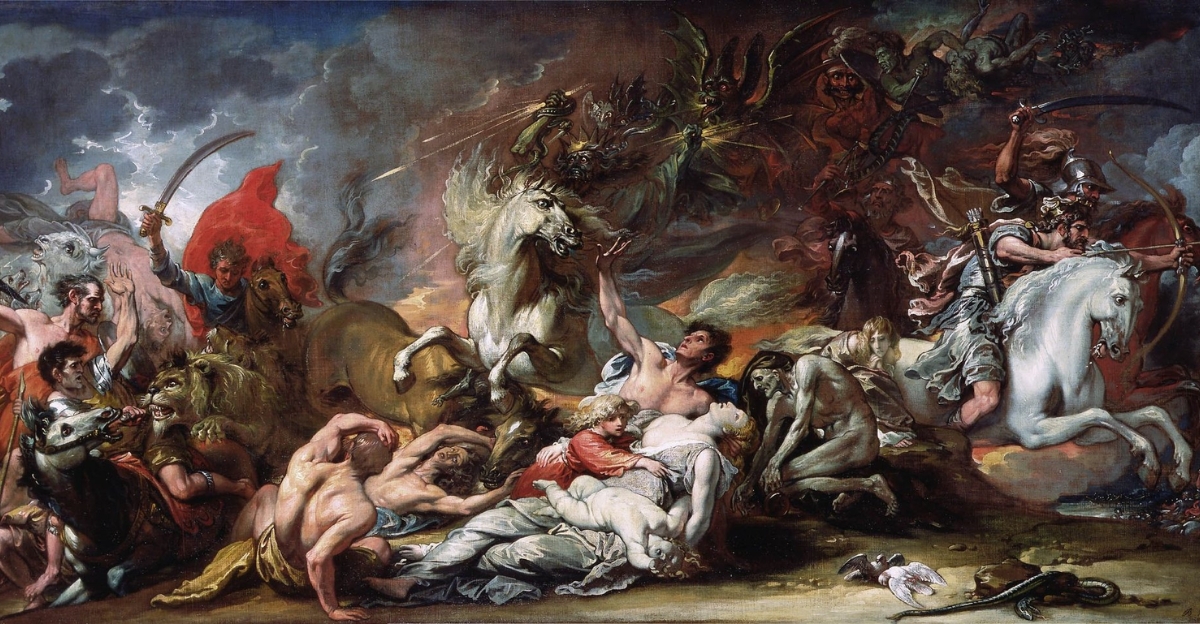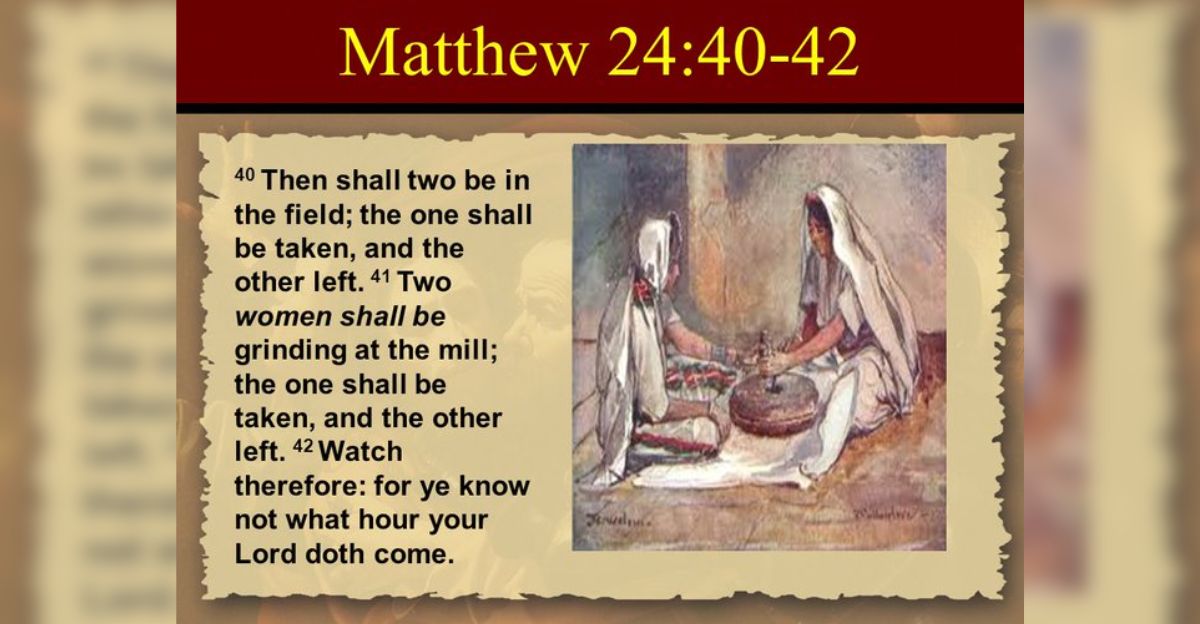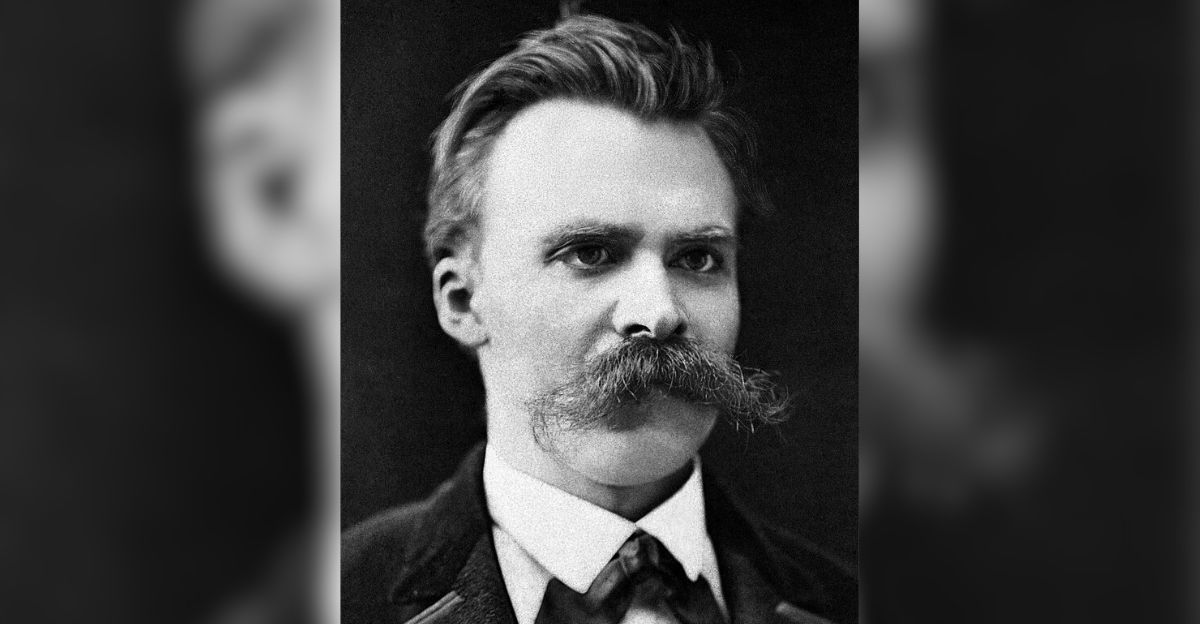
When we explore the Rapture’s linguistic and theological foundations, the word ‘rapture’ comes ‘rapturo’ (Latin) which inturn was derived from ‘harpazo’ (Greek). Harpazo essentially means ‘caught up’ and is referenced in 1 Thessalonians 4:17 where it is spoken about how believers are ‘caught up’… in the clouds to meet God. Yet, the word rapture itself is not seen in the Bible.
In modern theology, the Rapture is conceptualized as the pre-tribulation event before the Second Advent of Christ. In the pre-tribulation event, Jesus would come down to Earth and save the church, and the Second Advent of God is a post-tribulation event in which God would return and establish a kingdom of heaven on Earth.
Historical Origins

The Irish theologian John Nelson Darby (1800 – 1882) popularized the theological framework of dispensationalism in the 19th Century. It looks at history and divides it into different and specific eras where God interacted with humanity. Darby’s work is still very influential in bringing context to understanding the Rapture in the modern world.
After the Civil War, his frameworks and views gained more popularity in America. Significant changes were happening during this time, such as the industrialization boom and a rise in global conflicts, which gave way to more anxieties. Before Darby’s work, no other traditions in Christianity focused on a pre-tribulation Rapture.
Biblical Analyses

Most theologians who believe in the Rapture would often quote from the Bible, out of Matthew 24:40-42 and 1 Thessalonians 4:16-17 as evidence to support their beliefs. Upon a closer look at these texts, no time references are given, so it is unclear if the Rapture (pre-tribulation event) or the second coming of God is referred to here. An example here would be Matthew 24, which reads, ‘the gathering of the elect ’ after tribulations took place, which is in contrast with previous frameworks of pre-tribulation works.
Furthermore, the word parousia (Greek) was used to describe both the second coming of God as well as in reference to the Rapture, so one cannot make a clear distinction as to which one is being referred to in the Bible, obscuring our understanding. In 1 Thessalonians 5:2-6, the Apostle Paul writes in a way that favors being ready for an event such as the second coming/rapture rather than trying to rely on our speculations as to the specific timeline in which these events might take place.
Theological Evolution

Post cival war communities were in dire need of hope and turned to faith for answers. This lead to an increase in interest in Darby’s dispensationalism. The apeal of Darby’s 7 dispensations lays in the fact that it provided this.
The Rapture as a cultural phenomenon only returned after the work of Hal Lindsey came about around the 1970s. Examples of his work series include ‘The Left Behind’ as well as ‘The Late Great Planet Earth’. Even though these theory frameworks have endured varies acedemic critiques and scrutiny, they still hold merrit with many as it came at a time where an elastic theological framework was needed which could encompass difficult times such as pandemics, the civil war, fears from the cold war as well as golbal health and climate crisis were on the rise.
Further Rebuttals, Criticisms, and Contraversies

Back in the day, Fathers of the Church as well as Augustine for example, did not interpret Revelation in the Bible literally, but rather in more of a symbolic nature. Darby’s work empahized the seperation between the Church and Israel.
More modern academic scholars pinpoint that this dual-covenant framework of Darby contradicts other teachings, such as those of Pauline, making use of Romans 11:17-25, where gentiles, as it may, are ‘crafted into the spiritual heritage of Israel’. There are more liberal theologians as well as academic scholars who believe that the Rapture is only a myth. They are of the opinion that the people believing in the Rapture project existential anxieties that humanity faces. This was especially true in the 19th Century.
Cultural Impact

From a psychological point of view, the more people believed that the Rapture was imminent, the more long-term planning decreased, and financial risk-taking in the short term increased. This impact is explored in surveys and dubbed Apocalyptic Psychology. Even pop culture integrated with notions of the Rapture, for example, the +/- 63 million copies of ‘Left Behind’, sold during that time.
Christianity vaulues stewardship and social justice but the rising believe in the Rapture, the ‘apocalyptic presentism’, differs from this way of thinking and inspiredcritque and questions about if prioritizing evangelism above systematic reform is best or not.
Rapture, a Modern Myth?

Analysis of the New Testament reveals that there are no specific teachings indicating a 2 part return of God (Christ) that suggests a rapture and a second coming together. Texts in the Bible that are used in support of the Rapture, rather, allude more to a climactic event where Christ will return at the end stage. A secret rapture as well as a second coming is less visible within scripture, but forms a cornerstone of the arguments that support the notion of a rapture.
Is it possible that notions towards the Rapture happening to mankind before the second coming of God are just another form of escapism? Well academic scholars beleave it is as they recount that believers in the Rapture rely on erroneous calculations, distortion of the Bible and their own opinions when they educate others on the Rapture.
Contrarian Viewpoints

Nietzsche referred to the ‘God is dead crisis’ as a reason why he does not support Darby’s notion of the Rapture, because Nietzsche too believed that rapture teachings are fueled mainly by the anxieties and chaos of industrialization. Thus, Nietzsche supports the idea that Rapture teachings is a form of escapism too.
Many failed prophecies about the Rapture, such as Harold Camping’s doomsday prophecy in 2011, have not come to pass. Yet, psychologically, for a brief time, these prophesies provided a sense of certainty for people in a time when most other things were quite uncertain. These prophecies and other rapture teachings rather mirror the framework of dystopian fiction than actual fact.
Strategic Implications

One can only imagine that the popularity of the beliefs surrounding the Rapture extended into global policies. Armageddon (Doomsday) or the Rapture, rooted in dispensationalism with Israel’s role in it made clear, has actually impacted U.S. foreign policies. In essence, evangelists at the time gave their support for Israel to, in effect, fulfill the prophecy as laid out in Ezekiel 38-39 that hints at an Iranian-Russian coalition attack. Bringing theological notions into politics and diplomacy only complicates global matters further.
Future directories of rapture teaching are persisting with prophecies linking it to the growth we see in AI as well as transhuman space discoveries being probable. Now the rapture teachings are finding its footing in the digital age and the anxieties that stems from it. Giving people something to hold onto in the modern chaotic world.
In conclusion, we can see that specific notions that the Rapture, the 7-year tribulation humanity will face, are not present in the Bible, and the idea itself is a relatively recent theological construct. We can also look back over time and see how circumstances and pop culture motivated this notion further.
Believing and preparing for the Rapture could give hope to those who seek it in an unstable and uncertain modern world. These beliefs might help individuals to feel like mankind could transcend all the challenges that we face on Earth. That is why beliefs in the Rapture are still so popular today, and more prophecies are made all over the world every year.






